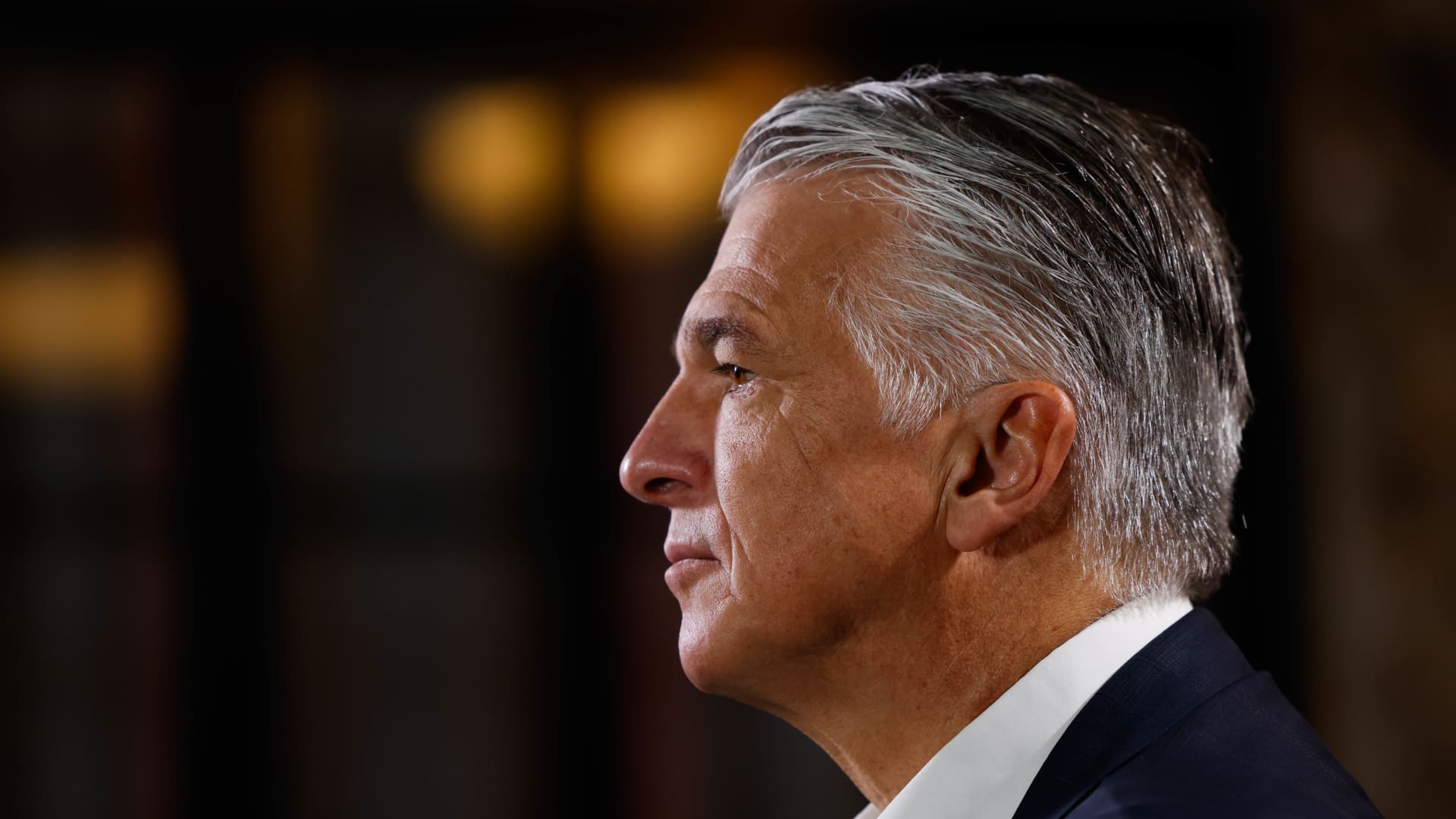UBS CEO Sergio Ermotti on Tuesday, May 7, 2024.
Bloomberg | Bloomberg | Getty Images
After an intense weekend of negotiations in March 2023, Swiss banking giant UBS agreed to buy its embattled rival Credit Suisse.
Despite the attractive purchase price of $3.2 billion, investors were concerned about whether UBS would manage to turn around Credit Suisse’s investment banking business — an old source of problems. UBS had also become one the biggest banks in Europe, raising political and regulatory fears.
At the time, investors were “very concerned” about the complexity of the deal and whether UBS would make it work, Bruno Verstraete, founder of Lakefield Wealth Management, told CNBC by email.
“When a healthy individual is sleeping next to someone with a severe flu, they are likely to contract it as well,” he said.
The acquisition was so complex that UBS decided to change leadership and bring back former CEO Sergio Ermotti to the bank’s helm to oversee the merger.
“Given the market conditions, political dynamics, and time constraints under which the deal was executed, investors were acutely aware of the significant risks associated with acquiring unknown liabilities,” Verstraete added. Lakefield, which provides wealth management services, holds a position in UBS on behalf of a client.
Now, 18 months later, that sentiment is changing, and many agree this is the deal of the decade.
“The merger with Credit Suisse currently goes along the planned milestones and timelines, and the UBS leadership under CEO Sergio Ermotti has been absolutely right to push ahead ambitiously,” Beat Wittmann, chairman at Porta Advisors, told CNBC by email.

UBS
UBS concluded the merger of the parent companies in May, then finalized the transition to a single U.S. intermediate holding in June. In July, it fully merged the Swiss entities of Credit Suisse and UBS. The entire process is expected to wrap up in 2026.
“The integration process is being conducted in a typically Swiss manner — disciplined, pragmatic, and seemingly on track. Calm and trust have been restored,” Verstraete said.
The dissipating concerns were also clear when UBS reported second-quarter results in August, with analysts changing tack to focus on the actual business performance, rather than on the details of the merger.
UBS‘ announcement of faster progress on cost savings also pleased investors. The bank now expects to reach $7 billion in cost savings in 2024, or more than half of UBS’ $13 billion target for the whole duration of the merger process by 2026. The figures compare with a 2022 baseline.
‘A lot of work ahead of us’
But Ermotti is not putting his feet up.
“Let me reiterate something you have heard me say before. We still have a lot of work ahead of us to address Credit Suisse’s structural lack of sustainable profitability,” he said in August following the results.
“While we are encouraged by the significant progress we have made across the group, the path to restoring profitability to the pre-acquisition levels won’t be linear,” Ermotti added.
One of the big overhangs is potential new capital requirements from Swiss authorities.
Swiss Finance Minister Karin Keller-Sutter told the country’s Tages-Anzeiger newspaper earlier this year that it is “plausible” UBS will require a further $15 billion to $25 billion in capital to deal with national anxieties that the bank has become too big to be saved.
Clarity on these capital additions is expected to emerge in early 2025.
As such, some investors still need a little bit more convincing.
“The key indicator to watch for UBS fortunes is the share price, and the capital market displays a simple and clear ‘show me first’ attitude,” Porta Advisors’ Wittmann said.
UBS shares rallied in the wake of the deal in March 2023, but have steadied somewhat since. They are up more than 21% over the last 12 months, but only 1% over the year to date.
For context, HSBC shares are up 11% over the last year and 3% year-to-date, while Credit Agricole is 19% higher over the past 12 months and up 6.5% since the start of 2023.
While UBS’ future remains uncertain, some are celebrating the developments so far.
“This transaction could be recorded in history as one of the most successful deals ever made,” Verstraete said, adding that “Mr. Ermotti stands poised to become a national hero, though whether this acclaim will come from Swiss citizens, employees, FINMA [Swiss Financial Market Supervisory Authority], or shareholders remains to be seen.”





